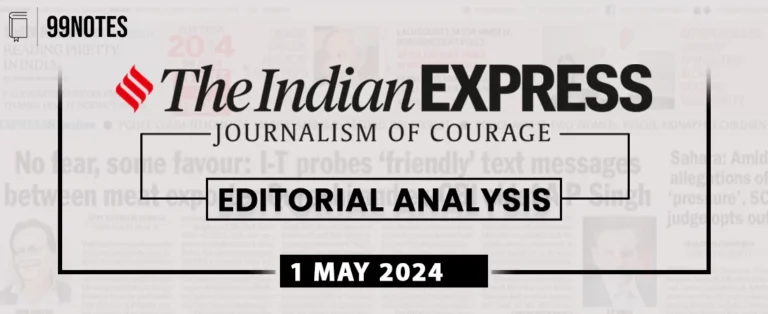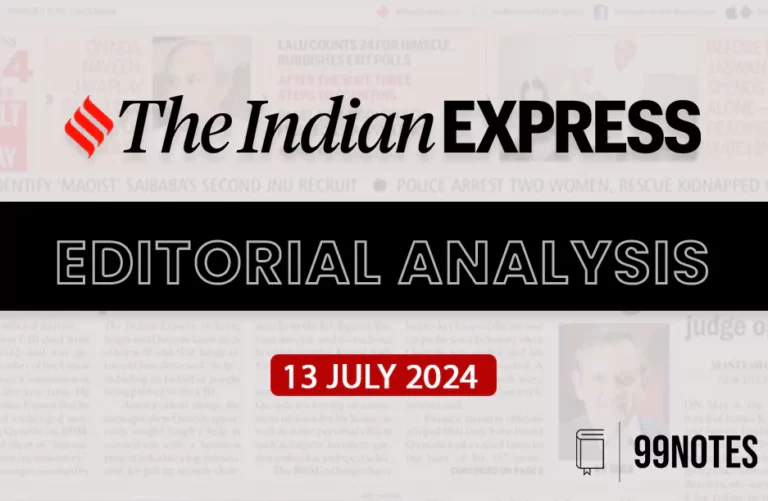21 September 2024 : Indian Express Editorial Analysis
1. FOR LIBERTY, BY LAW
(Source: Indian Express; Section: The Editorial Page; Page: 10
| Topic: GS2– Polity |
| Context: |
| The article discusses the evolution of judicial thought in India, highlighting recent Supreme Court decisions that prioritize due process and personal liberty under Article 21, even in the face of stringent laws like UAPA and PMLA. |
Introduction: A Momentous Debate in the Constituent Assembly
- On December 6, 1948, despite the cold weather, the atmosphere in the Constituent Assembly was heated as members discussed one of the most crucial rights enshrined in the Constitution: the right to life and personal liberty under Article 21.
- K.M. Munshi delivered a powerful and intellectual argument, asserting that the right to life and liberty should not be left at the mercy of ordinary laws.
- His stance emphasized the necessity of protecting due process and ensuring that fundamental rights remain inviolable, no matter the legislative context.
- He was not alone in this argument; many others, including KT Shah, Bakshi Tek Chand, and Purnima Banerji, shared his vision.
Supreme Court’s Affirmation of Due Process Rights
- Fast forward to July 2023, a division bench of the Supreme Court, comprising Justice J.B. Pardiwala and Justice Ujjal Bhuyan, confronted a vital question: should a person be entitled to bail, even under strict laws like the Unlawful Activities (Prevention) Act (UAPA), if the trial is excessively delayed?
- The Court, invoking Article 21, declared that even in cases involving serious charges, prolonged trials cannot justify indefinite imprisonment.
- This interpretation of due process underscores that no law can override the fundamental right to life and personal liberty.
- The Supreme Court reinforced that courts are not constrained by punitive statutory provisions when protecting these basic rights.
Reaffirmation of Due Process Under Special Laws
- The trend of prioritizing due process rights over restrictive legal provisions was further emphasized in a subsequent Supreme Court decision regarding bail under the Prevention of Money Laundering Act (PMLA).
- Justices B.R. Gavai and K.V. Viswanathan affirmed that since the right to life and liberty is a “higher constitutional right,” statutory provisions must align with this principle.
- They emphasized that personal liberty cannot be seen as an exception, even under strict penal laws, marking a pivotal moment in judicial reasoning.
- This approach highlights that fundamental rights, particularly the right to life and liberty, should always prevail over statutory restrictions.
The Legacy of Bail Jurisprudence: Reviving the Pro-Bail Approach
- Historically, Indian constitutional jurisprudence has maintained that bail is the rule and jail is the exception. This principle, rooted in the preservation of personal liberty, was championed by iconic justices like Krishna Iyer.
- However, with the enactment of laws like the UAPA and PMLA, which impose severe restrictions on granting bail, this principle has often been sidelined.
- Nonetheless, recent court decisions suggest a shift back toward the pro-bail approach, reaffirming the importance of protecting individual liberty while balancing the demands of special laws.
Conclusion: Vindication of the Founders’ Vision
- The robust protection of personal liberty, a fundamental pillar of the Indian Constitution, was a central concern for the framers of the Constitution.
- Although Article 21 does not explicitly mention due process rights, the courts have gradually reinstated the vision of the Constituent Assembly members.
- These recent judicial decisions vindicate the foresight of India’s founding mothers and fathers, particularly in upholding the primacy of due process in safeguarding fundamental freedoms.
- As India marks the 75th anniversary of its Constitution, the reaffirmation of these values is a profound testament to the enduring strength of constitutional democracy.
| Important cases to understand basic evolution of Article 21 of the Indian Constitution |
| The terms ‘life’ and ‘personal liberty’ encompass a wide variety of rights of the people, which are a result of the evolution in the interpretation of Article 21 by the courts over the years. Here, we shall examine the various aspects of this Fundamental Right. However, before that, it is important to have a look at the jurisprudential evolution of this concept and the significance of most famous judgements related to it. A.K. Gopalan v. State of Madras (1950): Prevention Detention Facts In this case, the Petitioner, a communist leader, was detained under the Preventive Detention Act, 1950. He claimed that such detention was illegal as it infringed upon his freedom of movement granted in Article 19(1)(d) of the Constitution of India and thus also violated his Personal Liberty as granted by Article 21 since freedom of movement should be considered a part of a person’s personal liberty. Judgement The court stated that personal liberty meant liberty of the physical body and thus did not include the rights given under Article 19(1). Hence, Personal liberty was considered to include some rights like the right to sleep and eat, etc. while the right to move freely was relatively minor and was not included in one’s “personal” liberty. Kharak Singh v. State of U.P. and Ors. (1964): Personal Liberty Curtailed Facts The petitioner, in this case, was accused of dacoity but was released due to a lack of evidence against him. The Uttar Pradesh Police then began surveillance over him which included domiciliary visits at night, periodical enquiries, verification of movements and the like. The petitioner filed a writ petition challenging the constitutional validity of this State action. Judgement It was held that the right to personal liberty constitutes not only the right to be free from restrictions placed on one’s movements but also to be free from encroachments on one’s private life. Thus, personal liberty was considered to include all the residual freedoms of a person not included in Article 19(1). Maneka Gandhi v. Union of India (1978): Right to Travel Facts The petitioner, in this case, was ordered by the Regional Passport Office, Delhi to surrender her newly-made passport within 7 days due to the Central Government’s decision to impound it “in public interest”, in accordance with the Passport Act of 1967. Upon requesting a statement of the reasons for such impounding, the Government replied that they could not furnish a copy of the same “in the interest of the general public.” A writ petition was filed by the petitioner challenging the Government’s decision of impounding and also of not providing the reasons, as well as not allowing the petitioner to defend herself. Judgement The Honourable Supreme Court held that the right to travel and go outside the country must be included in the Right to Personal Liberty. It stated that “personal liberty” given in Article 21 had the widest amplitude and covered a variety of rights related to the personal liberty of a person. The scope of personal liberty was, hence, greatly increased and it was held to include all the rights granted under Article 21, as well as all other rights related to the personal liberty of a person. Such a right could only be restricted by a procedure established by law, which had to be “fair, just and reasonable, not fanciful, oppressive or arbitrary.” |
| PYQ: The Constitution of India is a living instrument with capabilities of enormous dynamism. It is a constitution made for a progressive society. Illustrate with special reference to the expanding horizons of the right to life and personal liberty. (250 words/15m) (UPSC CSE (M) GS-2 2023 |
| Practice Question: Discuss the evolving interpretation of Article 21 of the Indian Constitution with reference to recent Supreme Court judgments. How has the judiciary balanced personal liberty and stringent laws like the UAPA and PMLA? Critically analyze the implications for due process rights in India. (250 words/15 m) |



